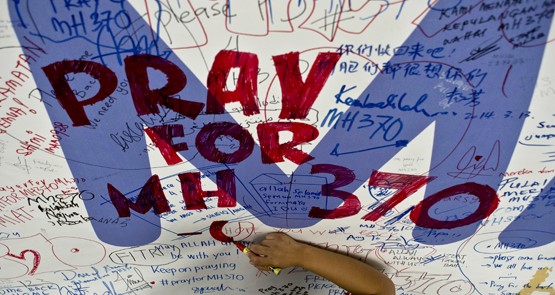
Former PM Tony Abbott’s embarrassing conduct and Angus Houston’s numerous blunders in relation to the search for missing Malaysia Airlines flight MH370 have been massaged out of Transport Minister Darren Chester’s recent summary of Australia’s involvement in that quest.
Chester’s effort can be read here and follows his role in a surreal tripartite press conference involving the Malaysia, China and Australia search partners in Putrajaya, Malaysia, on Friday afternoon.
That announcement was dressed up as decision to “suspend” the search after the current priority search zone is exhausted, possibly even later than this December. But the Chester summary backtracks on that by conceding (as often reported by Crikey) that the decision was in effect taken 15 months ago:
“At a meeting of Ministers from Australia, Malaysia and the People’s Republic of China held in Kuala Lumpur on 16 April 2015, it was agreed that the search area would be extended to 120,000 square kilometres, thereby covering the entire highest probability area identified by expert analysis. It was also agreed that in the absence of credible new information that leads to the identification of a specific location of the aircraft, would be no further expansion of the search area.”
With all of the information retention skills of a goldfish, the general meeting fell for this en masse, headlining the suspension decision as new. Coverage of MH370 has turned into a BuzzFeed caricature, where it is assumed everything reported more than a few weeks previously is forgotten and can be regurgitated for reconsumption.
[Crikey Clarifier: we might have found MH370 — now what?]
The most egregious omission from the sanitised summary of Australia’s MH370 involvement was the process by which Air Chief Marshal Angus Houston gave Abbott an opportunity to grandstand about Australia probably detecting acoustic pings from the black box recorders from MH370 in waters north-west of Perth while he was on official business in Shanghai on April 11, 2014.
That farce began with Houston invoking an “acoustic signal centre of excellence” within the Royal Australian Navy at Jervis Bay as having analysed underwater acoustic signals that had actually been picked up by an Australia vessel several days earlier.
Houston, then leading the newly formed Joint Agency Coordination Centre, or JACC, told the media he had listened to the signals and believed they were genuine and from the two black boxes, the cockpit voice recorder and the flight data recorder.
Whether Houston even had the capacity to adequately identify such signals was open to doubt, as were the capabilities of the previously unheard of, and never since mentioned, naval centre of acoustic excellence, but the “pings” were seized upon by Abbott as a means of grabbing the centre stage spotlight in China.
Somewhat urgent efforts to hose down the Houston-Abbott axis of acoustical delusion failed until after the PM’s bold statements had become a disgrace and caused immense pain to the families of some of the 239 people who were on board MH370, most of them Chinese nationals, on a 777 that was flying from Kuala Lumpur to Beijing when it vanished on March 8, 2014.
A scathing review of the Houston-Abbott mutual process of self-deception and media posturing can be found here.
[Was MH370 hijacked? The conspiracy theory that will not die]
Darren Chester’s gelded version of Australian involvement also coincides with a reappearance in many media outlets of a report in New York Magazine by Jeff Wise that the captain of the missing jet had practised a flight into the far southern Indian Ocean on his home flight simulator in the period before MH370 disappeared.
That story was widely reported, but not as smoothly written, in the months following MH370 abruptly vanishing over the Gulf of Thailand. It cannot be dismissed, other than to note that it may as well be fictional given that there is no evidence in the public domain to support it.
As the strange press conference in Putrajaya revealed last Friday, there are signs of tension between France and Malaysia over the repatriation of the recovered flaperon of MH370 to the Malaysia-led investigation of the crash, which is a separate operation to the Australia-led deep ocean search.
A logical, but far from provable explanation for this tension is provided by earlier reports that the French criminal inquiry into the crash (which killed four French nationals) is unhappy at the lack of co-operation from the Malaysians as to what their criminal inquiries have uncovered.
*This article was originally published at Crikey blog Plane Talking








So much money has been spent in such an improbable search that I suspect the missing plane was used as a cover story for searching for something else on the ocean floor.
Oil would be my guess.